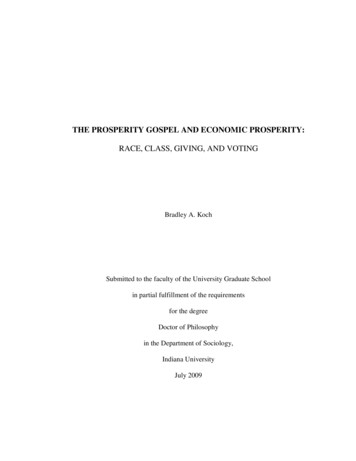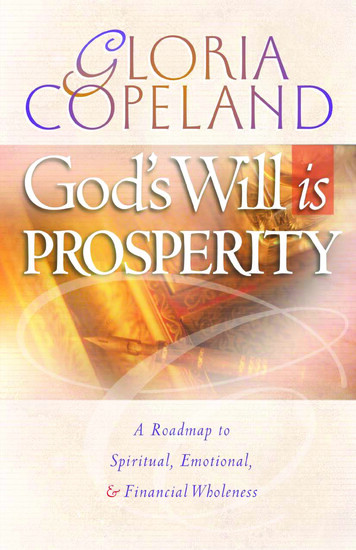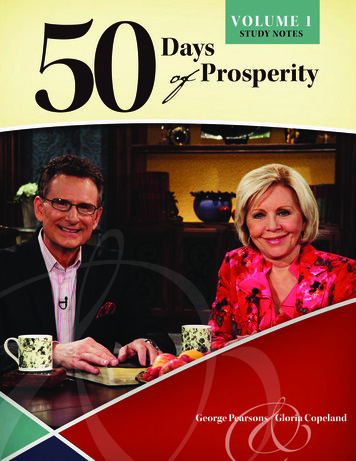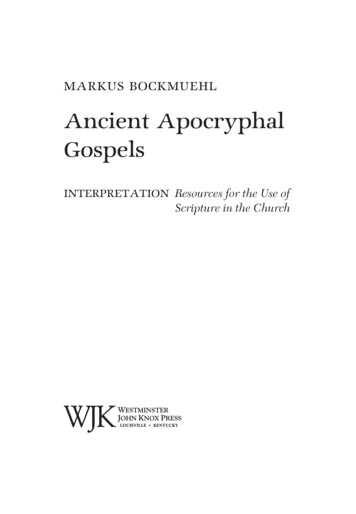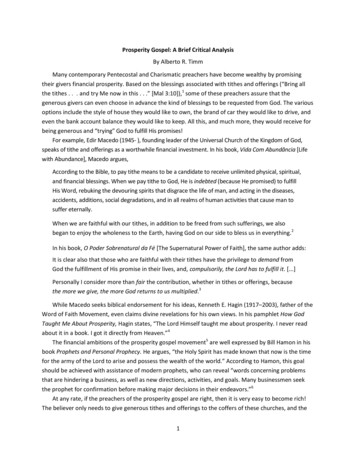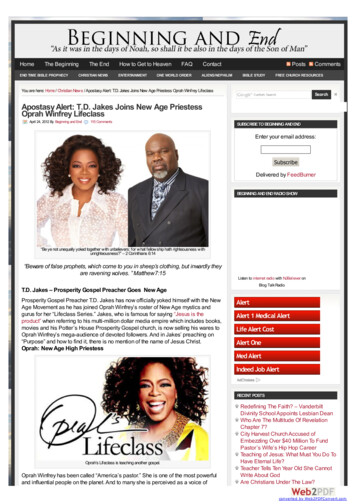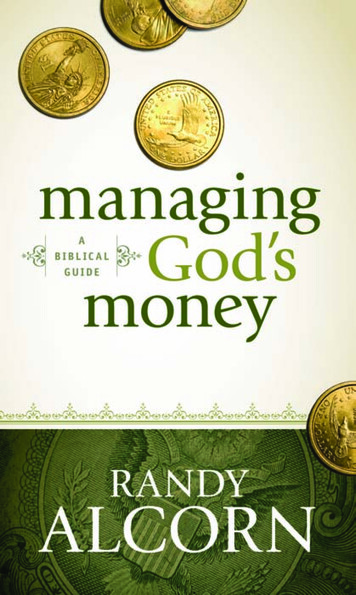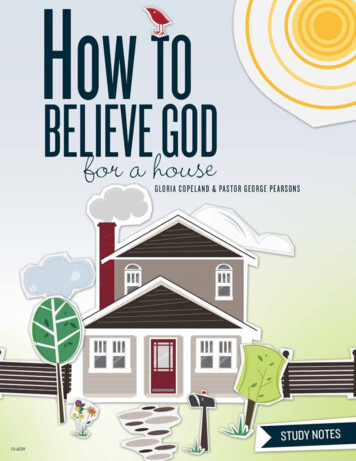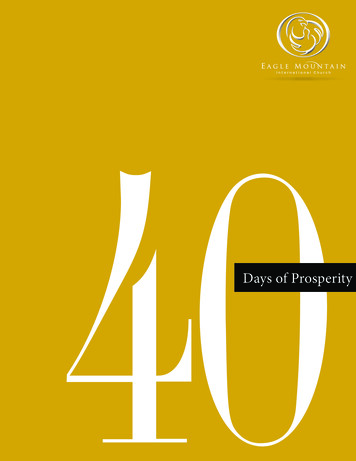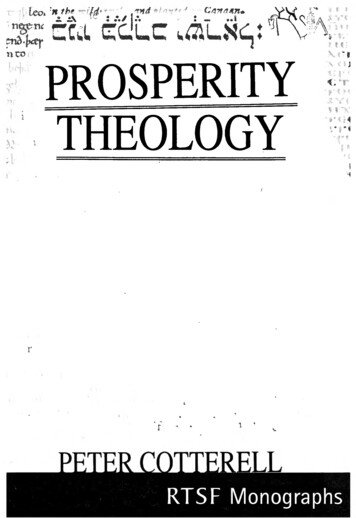
Transcription
https://nyti.ms/1oapiM7OPINIONDeath, the Prosperity Gospel and MeBy Kate BowlerFeb. 13, 2016Durham, N.C. — ON a Thursday morning a few months ago, I got a call frommy doctor’s assistant telling me that I have Stage 4 cancer. The stomachcramps I was suffering from were not caused by a faulty gallbladder, but by amassive tumor.I am 35. I did the things you might expect of someone whose world hassuddenly become very small. I sank to my knees and cried. I called myhusband at our home nearby. I waited until he arrived so we could wrap ourarms around each other and say the things that must be said. I have loved youforever. I am so grateful for our life together. Please take care of our son. Thenhe walked me from my office to the hospital to start what was left of my newlife.But one of my first thoughts was also Oh, God, this is ironic. I recently wrote abook called “Blessed.”I am a historian of the American prosperity gospel. Put simply, the prosperitygospel is the belief that God grants health and wealth to those with the rightkind of faith. I spent 10 years interviewing televangelists with spiritualformulas for how to earn God’s miracle money. I held hands with people inwheelchairs being prayed for by celebrities known for their miracle touch. I satin people’s living rooms and heard about how they never would have dreamedof owning this home without the encouragement they heard on Sundays.
I went on pilgrimage with the faith healer Benny Hinn and 900 tourists toretrace Jesus’ steps in the Holy Land and see what people would risk for thechance at their own miracle. I ruined family vacations by insisting on beingdropped off at the showiest megachurch in town. If there was a river runningthrough the sanctuary, an eagle flying freely in the auditorium or an enormous,spinning statue of a golden globe, I was there.Growing up in the 1980s on the prairies of Manitoba, Canada, an area largelysettled by Mennonites, I had been taught in my Anabaptist Bible camp thatthere were few things closer to God’s heart than pacifism, simplicity and theability to compliment your neighbor’s John Deere Turbo Combine withoutenvy. Though Mennonites are best known by their bonnets and horse-drawnbuggies, they are, for the most part, plainclothes capitalists like the rest of us. Iadore them. I married one.But when a number of Mennonites in my hometown began to give money to apastor who drove a motorcycle onstage — a motorcycle they gave him for anew church holiday called “Pastor’s Appreciation Day” — I was genuinelybaffled. Everyone I interviewed was so sincere about wanting to gain wealth tobless others, too. But how could Mennonites, of all people — a tradition oncesuspicious of the shine of chrome bumpers and the luxury of lace curtains —now attend a congregation with a love for unfettered accumulation?The riddle of a Mennonite megachurch became my intellectual obsession. Noone had written a sustained account of how the prosperity gospel grew fromsmall tent revivals across the country in the 1950s into one of the most popularforms of American Christianity, and I was determined to do it. I learned thatthe prosperity gospel sprang, in part, from the American metaphysicaltradition of New Thought, a late-19th-century ripening of ideas about thepower of the mind: Positive thoughts yielded positive circumstances, andnegative thoughts negative circumstances.Variations of this belief became foundational to the development of self-help
psychology. Today, it is the standard “Aha!” moment of Oprah’s Lifeclass, thereason your uncle has a copy of “How to Win Friends and Influence People”and the takeaway for the more than 19 million who bought “The Secret.” (Saveyour money: the secret is to think positively.) These ideas about mind powerbecame a popular answer to a difficult question: Why are some people healedand some not?The modern prosperity gospel can be directly traced to the turn-of-the-centurytheology of a pastor named E. W. Kenyon, whose evangelical spin on NewThought taught Christians to believe that their minds were powerfulincubators of good or ill. Christians, Kenyon advised, must avoid words andideas that create sickness and poverty; instead, they should repeat: “God is inme. God’s ability is mine. God’s strength is mine. God’s health is mine. Hissuccess is mine. I am a winner. I am a conqueror.” Or, as prosperity believerssummarized it for me, “I am blessed.”One of the prosperity gospel’s greatest triumphs is its popularization of theterm “blessed.” Though it predated the prosperity gospel, particularly in theblack church where “blessed” signified affirmation of God’s goodness, it wasprosperity preachers who blanketed the airwaves with it. “Blessed” is theshorthand for the prosperity message. We see it everywhere, from a TV showcalled “The Blessed Life” to the self-justification of Joel Osteen, the pastor ofAmerica’s largest church, who told Oprah in his Texas mansion that “Jesusdied that we might live an abundant life.”Over the last 10 years, “being blessed” has become a full-fledged Americanphenomenon. Drivers can choose between the standard, mass-produced “JesusIs Lord” novelty license plate or “Blessed” for 16.99 in a tasteful aluminum.When an “America’s Next Top Model” star took off his shirt, audiences saw ittattooed above his bulging pectorals. When Americans boast on Twitter abouthow well they’re doing on Thanksgiving, #blessed is the standard hashtag. Itis the humble brag of the stars. #Blessed is the only caption suitable for viral
images of alpine vacations and family yachting in barely there bikinis. It says:“I totally get it. I am down-to-earth enough to know that this is crazy.” But italso says: “God gave this to me. [Adorable shrug.] Don’t blame me, I’mblessed.”Blessed is a loaded term because it blurs the distinction between two verydifferent categories: gift and reward. It can be a term of pure gratitude.“Thank you, God. I could not have secured this for myself.” But it can alsoimply that it was deserved. “Thank you, me. For being the kind of person whogets it right.” It is a perfect word for an American society that says it believesthe American dream is based on hard work, not luck.If Oprah could eliminate a single word, it would be “luck.” “Nothing about mylife is lucky,” she argued on her cable show. “Nothing. A lot of grace. A lot ofblessings. A lot of divine order. But I don’t believe in luck. For me luck ispreparation meeting the moment of opportunity.” This is America, where thereare no setbacks, just setups. Tragedies are simply tests of character.
Dadu ShinIt is the reason a neighbor knocked on our door to tell my husband thateverything happens for a reason.“I’d love to hear it,” my husband said.“Pardon?” she said, startled.“I’d love to hear the reason my wife is dying,” he said, in that sweet and sourway he has.My neighbor wasn’t trying to sell him a spiritual guarantee. But there was areason she wanted to fill that silence around why some people die young andothers grow old and fussy about their lawns. She wanted some kind of orderbehind this chaos. Because the opposite of #blessed is leaving a husband and atoddler behind, and people can’t quite let themselves say it: “Wow. That’sawful.” There has to be a reason, because without one we are left as helplessand possibly as unlucky as everyone else.One of the most endearing and saddest things about being sick is watchingpeople’s attempts to make sense of your problem. My academic friends didwhat researchers do and Googled the hell out of it. When did you start noticingpain? What exactly were the symptoms, again? Is it hereditary? I can outknow my cancer using the Mayo Clinic website. Buried in all their concern isthe unspoken question: Do I have any control?I can also hear it in all my hippie friends’ attempts to find the most healing kalesalad for me. I can eat my way out of cancer. Or, if I were to follow myprosperity gospel friends’ advice, I can positively declare that it has no powerover me and set myself free.The most I can say about why I have cancer, medically speaking, is that bodiesare delicate and prone to error. As a Christian, I can say that the Kingdom of
God is not yet fully here, and so we get sick and die. And as a scholar, I can saythat our society is steeped in a culture of facile reasoning. What goes aroundcomes around. Karma is a bitch. And God is always, for some reason, goingaround closing doors and opening windows. God is super into that.The prosperity gospel tries to solve the riddle of human suffering. It is anexplanation for the problem of evil. It provides an answer to the question: Whyme? For years I sat with prosperity churchgoers and asked them about howthey drew conclusions about the good and the bad in their lives. Does Godwant you to get that promotion? Tell me what it’s like to believe in healing fromthat hospital bed. What do you hear God saying when it all falls apart?The prosperity gospel popularized a Christian explanation for why somepeople make it and some do not. They revolutionized prayer as an instrumentfor getting God always to say “yes.” It offers people a guarantee: Follow theserules, and God will reward you, heal you, restore you. It’s also distressinglysimilar to the popular cartoon emojis for the iPhone, the ones that show youimages of yourself in various poses. One of the standard cartoons shows meholding a #blessed sign. My world is conspiring to make me believe that I amspecial, that I am the exception whose character will save me from the grislypredictions and the CT scans in my inbox. I am blessed.The prosperity gospel holds to this illusion of control until the very end. If abeliever gets sick and dies, shame compounds the grief. Those who are lovedand lost are just that — those who have lost the test of faith. In my work, I haveheard countless stories of refusing to acknowledge that the end had finallycome. An emaciated man was pushed about a megachurch in a wheelchair aschurchgoers declared that he was already healed. A woman danced around hersister’s deathbed shouting to horrified family members that the body can yetlive. There is no graceful death, no ars moriendi, in the prosperity gospel.There are only jarring disappointments after fevered attempts to deny itsinevitability.
The prosperity gospel has taken a religion based on the contemplation of adying man and stripped it of its call to surrender all. Perhaps worse, it hasreplaced Christian faith with the most painful forms of certainty. Themovement has perfected a rarefied form of America’s addiction to self-rule,which denies much of our humanity: our fragile bodies, our finitude, our needto stare down our deaths (at least once in a while) and be filled with dread andwonder. At some point, we must say to ourselves, I’m going to need to let go.CANCER has kicked down the walls of my life. I cannot be certain I will walkmy son to his elementary school someday or subject his love interests tocheerful scrutiny. I struggle to buy books for academic projects I fear I can’tfinish for a perfect job I may be unable to keep. I have surrendered my favoritemanifestoes about having it all, managing work-life balance and maximizingmy potential. I cannot help but remind my best friend that if my husbandremarries everyone will need to simmer down on talking about how special Iwas in front of her. (And then I go on and on about how this is an impossibletask given my many delightful qualities. Let’s list them. ) Cancer requiresthat I stumble around in the debris of dreams I thought I was entitled to andplans I didn’t realize I had made.But cancer has also ushered in new ways of being alive. Even when I am thisdistant from Canadian family and friends, everything feels as if it is painted inbright colors. In my vulnerability, I am seeing my world without theInstagrammed filter of breezy certainties and perfectible moments. I can’t helpnoticing the brittleness of the walls that keep most people fed, sheltered andwhole. I find myself returning to the same thoughts again and again: Life is sobeautiful. Life is so hard.I am well aware that news of my cancer will be seen by many in the prosperitycommunity as proof of something. I have heard enough sermons about thosewho “speak against God’s anointed” to know that it is inevitable, despite thefact that the book I wrote about them is very gentle. I understand. Mosteveryone likes to poke fun at the prosperity gospel, and I’m not always
immune. No word of a lie: I once saw a megachurch pastor almost choke todeath on his own fog machine. Someone had cranked it up to the Holy Spiritmaximum.But mostly I find the daily lives of its believers remarkable and, often,inspirational. They face the impossible and demand that God make a way.They refuse to accept crippling debt as insurmountable. They stubbornly getout of their hospital beds and declare themselves healed, and every now andthen, it works.This is surely an American God, and as I am so far from home, I cannot escapehim.Kate Bowler is an assistant professor of the history of Christianity in North America at Duke Divinity School andthe author of “Blessed: A History of the American Prosperity Gospel.”Follow The New York Times Opinion section on Facebook and Twitter, and sign up for the Opinion Todaynewsletter.A version of this article appears in print on Feb. 14, 2016, Section SR, Page 1 of the National edition with the headline: Death, theProsperity Gospel and Me
called "The Blessed Life" to the self-justification of Joel Osteen, the pastor of America's largest church, who told Oprah in his Texas mansion that "Jesus died that we might live an abundant life." Over the last 10 years, "being blessed" has become a full-fledged American phenomenon.

